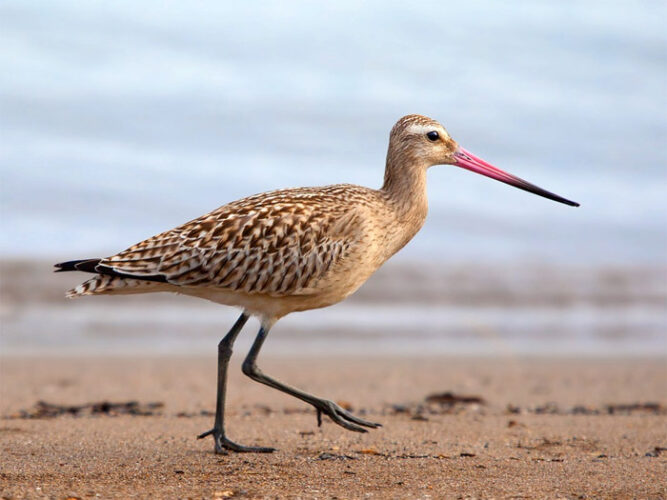(Photo above of a bar-tailed godwit)
A round-up of environmental news that’s been overlooked recently.
By Colin Serjent
Bird breaks record with 57-hour flight
A migrating bird has finally landed in New Zealand after three attempts to make one of the world’s longest bird migration flights.
Identified as 4BYWW by the bands on its legs, the male godwit’s epic journey could be followed and measured because it had been fitted with a tracking device.
When analysed, it was found it had broken the record of making the longest flight ever recorded by a land bird, totalling 57 hours of constant flight.
Number of birds in Europe plummets by 600 million
Sparrow numbers in Europe have declined by 247 million since 1980 and other formerly abundant bird species have suffered huge decreases.
Europe has lost around 600 million breeding birds since 1980, including common species like yellow wagtails (97 million fewer), starlings (75 million fewer) and skylarks (68 million fewer), the research by the RSPB and Birdlife International found.
Wildlife charity urges public to support reintroducing beavers across England
A wildlife charity is urging the public to support its plans to reintroduce beavers to rivers across England.
The dam-building rodents were hunted to extinction in England 400 years ago, but have now successfully colonised a number of rivers, including the River Otter in east Devon.
Beaver dams have been shown to help filter water pollutants, reduce flood risks by breaking up water flows following heavy rain and aid the creation of carbon-sequestering wetlands.
Rare whale species falls to 20-year low
A whale that is one of the rarest marine mammals in the world lost nearly 10 per cent of its population in 2020. The North Atlantic Right whale numbered only 366 in 2019, and its population fell to 336 in 2020, the North Atlantic Right Whale Consortium said. The estimate is the lowest in nearly two decades.
Rare chicks hatch at Chester zoo
Two highly endangered red-billed curassow chicks have hatched at Chester Zoo in Cheshire, in what has been hailed as a significant moment for the species. Fewer than 200 of the birds remain in the wild. They are regarded as one of the world’s rarest bird species.
Glaciers will be gone in 20 years
Africa’s rare glaciers will disappear within two decades because of climate change.
Africa’s 1.3 billion people remain extremely vulnerable as it warms at a faster rate than the global average.
Yet Africa’s 54 countries are responsible for less than 4% of global greenhouse gas emissions.
Rare eagle-owl spotted for the first time in 150 years
A rare owl known as the holy grail for birdwatchers has been photographed in the wild for the first time.
The dark eagle-owl is among the largest owls in the world. The species is thought to grow to around 24 ins in height, with each wing spanning up to 19 ins.
The bird has not been spotted in the African wild since the 1870s.
